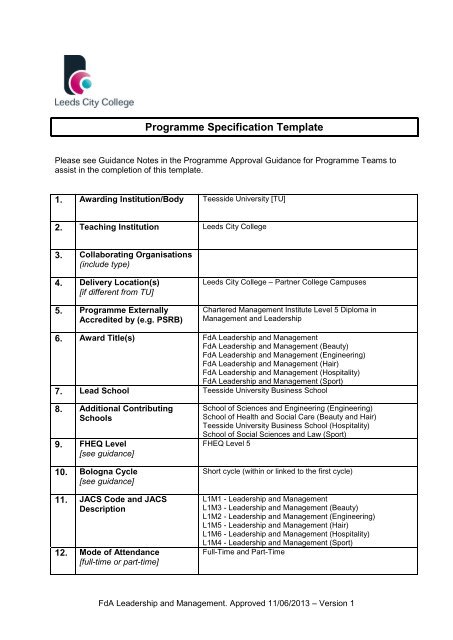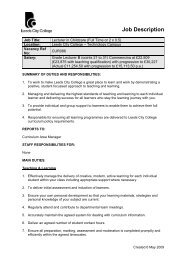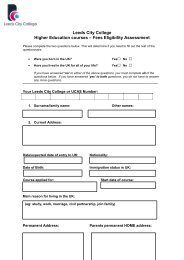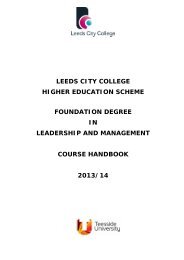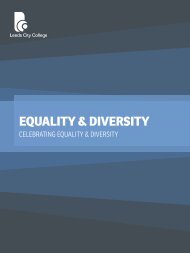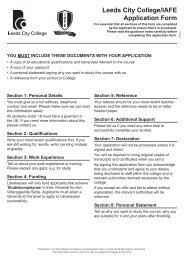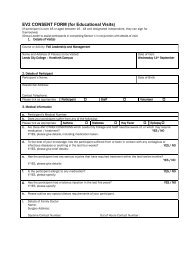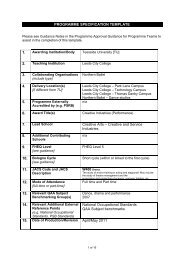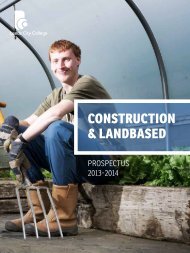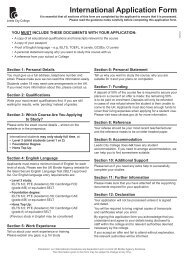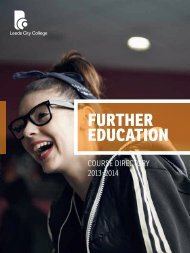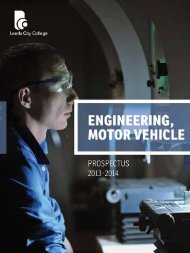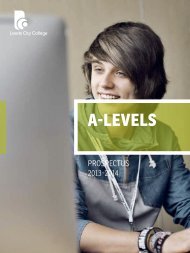Programme Specification FdA Template Leadership and ...
Programme Specification FdA Template Leadership and ...
Programme Specification FdA Template Leadership and ...
Create successful ePaper yourself
Turn your PDF publications into a flip-book with our unique Google optimized e-Paper software.
13. Relevant QAA SubjectBenchmarking Group(s)14. Relevant Additional ExternalReference Points(e.g. National OccupationalSt<strong>and</strong>ards, PSRB St<strong>and</strong>ards)15. Date of Production/Revision 11 th June 201316. Criteria for Admission to the<strong>Programme</strong>(if different from st<strong>and</strong>ardUniversity criteria)QAA General Business Management Benchmark Statement(2007)QAA Subject Benchmarks for Engineering (2006 - revised2010)QAA Subject Benchmarks for Hospitality, Leisure, Sport <strong>and</strong>Tourism (2008)QAA Foundation Degree Qualification Benchmark (2010).National Occupational St<strong>and</strong>ards for Management <strong>and</strong><strong>Leadership</strong> (2012)National Occupational St<strong>and</strong>ards for Hair <strong>and</strong> Beauty, inpartnership with Habia (Foundation Degree SectoralFrameworks for Hairdressing Industry (2006) <strong>and</strong> BeautyIndustry (2006));Engineering Council UK St<strong>and</strong>ard for ProfessionalEngineering Competence (UK-SPEC) (2011)SkillsActive National Occupational St<strong>and</strong>ards for SportCoaching (2006 – revised 2012)The minimum requirements are 1 x E in a relevant A level; orother Level 3 qualification; or Access to Higher Educationcertificate. A GCSE grade C in English, or equivalent, is alsorequired. However, c<strong>and</strong>idates receiving this offer will haveexperience in their chosen subject area.A typical offer is 2 X D at A level or a merit/merit profile in aBTEC Level 3 Diploma (was a National Certificate) / BTECLevel 3 Extended Diploma (was a National Diploma)qualification, alongside a number of GCSEs at C or above.All successful c<strong>and</strong>idates will have the required literacy skillsto complete the course. Students who do not have GCSEgrade C in English, or Maths, may need these to progress toTop Up degree programmes, <strong>and</strong> will be given the opportunityto gain these whilst on programme.We welcome applications from students who do not meet thest<strong>and</strong>ard entry requirements (for example mature c<strong>and</strong>idates).We will consider each applicant on their own merit <strong>and</strong>suitability, based on individual qualities, experience <strong>and</strong>learning from within the chosen occupational sector. Theseapplicants will be invited for interview, <strong>and</strong> asked to provideevidence of their experience.The course structure actively supports claims for Accreditationof Prior Certified Learning (APCL) <strong>and</strong> Accreditation of PriorExperiential Learning (APEL).Applicants for the part-time mode of study must be currentlyworking in the occupational sector.International qualifications will be assessed against thesecriteria. Speakers of other languages will need to possess anIELTS b<strong>and</strong> score of 6.0 (with no-less than 5.5 in any oneelement) or a recognised English Level 2 qualification.<strong>FdA</strong> <strong>Leadership</strong> <strong>and</strong> Management. Approved 11/06/2013 – Version 1
17. Educational Aims of the <strong>Programme</strong>The overall aims of the programme are to:• Develop knowledge, underst<strong>and</strong>ing <strong>and</strong> application of theories <strong>and</strong> concepts of leadership <strong>and</strong>management, as well as the legal, ethical <strong>and</strong> social responsibilities of leaders <strong>and</strong> managers.• Develop a range of leadership <strong>and</strong> management, technical, professional, <strong>and</strong> vocational skillsappropriate to the chosen occupational sector;• Develop personally <strong>and</strong> professionally within leadership <strong>and</strong>/or management contextsappropriate to the chosen occupational sector, whilst increasing independence in learning;• Develop reflective practice skills to reflect <strong>and</strong> learn from workplace experiences within thechosen occupational sector, applying relevant theory <strong>and</strong> practical projects.18. Learning OutcomesThe programme will enable students to develop the knowledge <strong>and</strong> skills listed below. Onsuccessful completion of the programme, the student will be able to:Knowledge <strong>and</strong> Underst<strong>and</strong>ing(insert additional rows as necessary)K1 Plan, undertake <strong>and</strong> evaluate a negotiated, self-managed leadership <strong>and</strong> managementrelatedproject using research methods.K2 Evaluate leadership <strong>and</strong> management theories, concepts <strong>and</strong> principles in specific areassuch as human resources, financial management, marketing <strong>and</strong> innovation & enterprise,within the chosen occupational sectorK3 Explore <strong>and</strong> analyse the impact of the legal, ethical <strong>and</strong> social responsibilities of leaders,managers, <strong>and</strong> organisations, relevant in the chosen occupational sectorCognitive/Intellectual Skills(insert additional rows as necessary)C1 Access, appraise <strong>and</strong> evaluate evidence from a range of appropriate leadership &management sources to be able to make independent judgements <strong>and</strong> to solve complexproblems.C2 Adopt intellectual flexibility, <strong>and</strong> the ability to apply new knowledge <strong>and</strong> underst<strong>and</strong>ing, withan openness to new ideas in leadership <strong>and</strong> management, taking into account strategy withina changing environmentPractical/Professional Skills(insert additional rows as necessary)P1 Operate ethically in complex <strong>and</strong> unpredictable people <strong>and</strong> project management contexts,requiring selection from <strong>and</strong> application of a wide range of techniquesP2 Operate autonomously with limited supervision or direction within agreed guidelines <strong>and</strong>/orconstraintsKey Transferable Skills(insert additional rows as necessary)T1 Reflect systematically on performance to further develop learning, being a reflectivepractitioner who appreciates issues associated with personal <strong>and</strong> professional development,<strong>and</strong> compares own values <strong>and</strong> practices with alternativesT2 Demonstrate a realistic match between career aspirations <strong>and</strong> personal aptitudes, interests<strong>and</strong> motivations, using external reference points <strong>and</strong> making clear connections betweenleadership <strong>and</strong> management <strong>and</strong> the occupational sectorT3 Select <strong>and</strong> use a range of communication methods appropriate to leadership <strong>and</strong>management <strong>and</strong> occupational contexts. Prepare, deliver <strong>and</strong> evaluate presentations to anaudienceT4 Apply numerical <strong>and</strong> statistical skills in more complex multi-disciplinary contextsT5Adopt a range of roles within a team <strong>and</strong> contribute to the effective working of the teamPathway Specific Outcome for Pathway 1 [<strong>Leadership</strong> <strong>and</strong> Management]S1 Evaluate appropriate <strong>and</strong> effective customer relations skills <strong>and</strong> organisational qualitysystems, communicating accurately <strong>and</strong> reliably, using structured, coherent <strong>and</strong> supported<strong>FdA</strong> <strong>Leadership</strong> <strong>and</strong> Management. Approved 11/06/2013 – Version 1
arguments in a range of contextsS2 Select <strong>and</strong> use appropriate tools in change management <strong>and</strong> learning <strong>and</strong> developmentmanagement to implement change <strong>and</strong>/or improvement within an organisationPathway Specific Outcome for Pathway 2 [Beauty]S1 Evaluate the ageing process <strong>and</strong> appropriate <strong>and</strong> effective skincare <strong>and</strong> bodyworktreatments, communicating accurately <strong>and</strong> reliably, using structured, coherent <strong>and</strong> supportedarguments in a range of contextsS2 Explore <strong>and</strong> analyse the impact of nutrition, metabolism, <strong>and</strong> digestion on health <strong>and</strong>diseases.Pathway Specific Outcome for Pathway 3 [Engineering]S1 Evaluate appropriate <strong>and</strong> effective operational management skills <strong>and</strong> organisational qualitysystems to manage change <strong>and</strong> learning development, communicating accurately <strong>and</strong>reliably, using structured, coherent <strong>and</strong> supported arguments in a range of contextsS2 Select <strong>and</strong> use appropriate tools in operational management, change management <strong>and</strong>learning <strong>and</strong> development management to implement change <strong>and</strong>/or improvement within anorganisation from the engineering sectorPathway Specific Outcome for Pathway 4 [Hair]S1 Evaluate concepts <strong>and</strong> principles relating to hair <strong>and</strong> scalp conditions, taking into accountproducts <strong>and</strong> treatments availableS2 Access, synthesise, appraise <strong>and</strong> critically evaluate environmental <strong>and</strong> influential factors inhair styling for photography <strong>and</strong> the science behind hair colouring, using evidence from arange of appropriate sources to gain underst<strong>and</strong>ing <strong>and</strong> make independent judgementsPathway Specific Outcome for Pathway 5 [Hospitality]S1 Evaluate appropriate, strategic <strong>and</strong> operational planning of conferences <strong>and</strong> events,communicating accurately <strong>and</strong> reliably, using structured, coherent <strong>and</strong> supported argumentsin a range of contextsS2 Access, synthesise, appraise <strong>and</strong> critically evaluate the retail environment <strong>and</strong> influentialfactors on retail operations, <strong>and</strong> the operational <strong>and</strong> economical characteristics of food <strong>and</strong>beverage operations, using evidence from a range of appropriate sources to gainunderst<strong>and</strong>ing <strong>and</strong> make independent judgementsPathway Specific Outcome for Pathway 6 [Sport]S1 Evaluate appropriate <strong>and</strong> effective skills in leading / managing the coach-athlete relationship<strong>and</strong> an athlete-centred approach to coaching, communicating accurately <strong>and</strong> reliably, usingstructured, coherent <strong>and</strong> supported arguments in a range of contextsS2 Explore <strong>and</strong> analyse the roles, skills, <strong>and</strong> theories of leadership in relation to leading sport<strong>and</strong> recreation in the wider community, applying inclusion strategies needed in planningcreative recreation sessions19. Key Learning & Teaching Methods• The module programme will impart the necessary leadership <strong>and</strong> management principles <strong>and</strong>concepts, as well as technical principles <strong>and</strong> concepts of the chosen occupational sector.• There is an emphasis towards practical work based learning <strong>and</strong> application in all modules,which underpin both context <strong>and</strong> industry relevant topics, allowing practical application ofleadership <strong>and</strong> management skills.• Every programme <strong>and</strong> pathway module will carry the expectation of work-based application oftheory <strong>and</strong> the use of work-related / experienced examples in class discussion <strong>and</strong> moduleassessments.• Lectures <strong>and</strong> seminars, of both programme <strong>and</strong> pathway core modules, will not take thetraditional form of tutor led delivery. Rather, all timetabled sessions will be very practical driven,with a good number of activities <strong>and</strong> group work making up the main component of delivery.For instance, group <strong>and</strong> class discussions, role plays, case study review, research tasks, groupcollaboration tasks, simulated work-related activities, <strong>and</strong> others. Theoretical <strong>and</strong> academiccomponents will be embedded into these, with practical application <strong>and</strong> sharing of experiencesbeing paramount.• Seminars <strong>and</strong> tutorial support, as well as on-line support <strong>and</strong> additional resources, will impartcontextualisation to the chosen occupational sector.<strong>FdA</strong> <strong>Leadership</strong> <strong>and</strong> Management. Approved 11/06/2013 – Version 1
- Specific to the Beauty <strong>and</strong> Hair pathways where specific knowledge <strong>and</strong> underst<strong>and</strong>ingof treatment / diet planning is demonstrated in meeting the needs of specified clients• Practical coaching <strong>and</strong> reflection- Specific to the Sport pathway modules where practical sessions are planned <strong>and</strong>delivered, supported by a thorough reflection of effectiveness <strong>and</strong> development needsStudents will not be assessed in the work place, however will be expected to draw upon workbasedexperiences <strong>and</strong> examples within all their module assessments, respecting the employer’s<strong>and</strong> colleague’s rights to confidentiality <strong>and</strong> anonymity.<strong>FdA</strong> <strong>Leadership</strong> <strong>and</strong> Management. Approved 11/06/2013 – Version 1
21. <strong>Programme</strong> Modules(additional copies to be completed for each named pathway)Level 4 Semester 1Code Title Credits StatusIntroduction of <strong>Leadership</strong> <strong>and</strong> Management 20 <strong>Programme</strong>CoreProfessional Development 20 <strong>Programme</strong>CoreManaging Customer Relations (generic) 20 PathwayCorePhysiology of Ageing (Beauty) 20 PathwayCoreOperations Management (Engineering) 20 PathwayCoreIntroduction to Trichology (Hair) 20 PathwayCoreManagement of Conferences <strong>and</strong> Events (Hospitality) 20 PathwayCoreCoaching Process (Sport) 20 PathwayCoreLevel 4 Semester 2Non-CompensatableYesCompensatableNoYesYesYesYesYesYesYesCode Title Credits StatusSector Contexts 20 <strong>Programme</strong>CoreFinance <strong>and</strong> Marketing for Managers 20 <strong>Programme</strong>CoreManaging Resources 20 <strong>Programme</strong>CoreLevel 5 Semester 1Non-CompensatableCompensatableYesYesYes<strong>FdA</strong> <strong>Leadership</strong> <strong>and</strong> Management. Approved 11/06/2013 – Version 1
Code Title Credits StatusProject Management 20 <strong>Programme</strong>CoreLeading People <strong>and</strong> Performance 20 <strong>Programme</strong>CoreLearning <strong>and</strong> Development in Organisations (generic <strong>and</strong>20 PathwayEngineering)CoreAdvanced Skincare <strong>and</strong> Bodywork Techniques (Beauty) 20 PathwayCoreHair Styling for Photography (Hair) 20 PathwayCoreFood <strong>and</strong> Beverage Management in Hospitality (Hospitality) 20 PathwayCoreCoaching Behaviour (Sport) 20 PathwayCoreLevel 5 Semester 2Code Title Credits StatusWork Related Learning 20 <strong>Programme</strong>CoreStrategy, Innovation <strong>and</strong> Enterprise 20 <strong>Programme</strong>CoreManaging Continuous Improvement <strong>and</strong> Change (generic <strong>and</strong> 20 PathwayEngineering)CoreBalanced Nutrition (Beauty) 20 PathwayCoreContemporary Colouring (Hair) 20 PathwayCoreHospitality <strong>and</strong> Retail Management (Hospitality) 20 PathwayCoreInclusive Recreation (Sport) 20 PathwayCoreNon-CompensatableNon-CompensatableYesCompensatableYesYesYesYesYesYesYesCompensatableNoYesYesYesYesYesYes<strong>FdA</strong> <strong>Leadership</strong> <strong>and</strong> Management. Approved 11/06/2013 – Version 1
22. <strong>Programme</strong> StructureOverview of structure of the modules across the Academic Year.Full-time route:Level 4:The programme has potentially three themes: equipping the student with core leadership <strong>and</strong>management skills, application of these skills <strong>and</strong> knowledge through work based experiences, <strong>and</strong>underst<strong>and</strong>ing contexts of leadership <strong>and</strong> management within chosen occupational sectors (forthose who choose so). Consistent contextualisation <strong>and</strong> application of module theory, to theoccupational sector of focus, will further link the learning of leadership <strong>and</strong> management skills,principles <strong>and</strong> concepts to the practical workings <strong>and</strong> employment opportunities of a chosenoccupational sector.The first semester aims to provide students with strong foundations in leadership <strong>and</strong>management, rooting it into an awareness of traditional versus modern management, managinghuman resources, <strong>and</strong> staff management (recruitment, disciplining, <strong>and</strong> person development). Theindustry application, however, is focussed around the need for practical application of these skillsinto the specific occupational sector; underst<strong>and</strong>ing the sector-specific dem<strong>and</strong>s <strong>and</strong> including 1pathway module choice from the sector curriculum (or a further generic leadership <strong>and</strong>management module).The second semester moves towards a more reflective <strong>and</strong> contextualised perspective ofleadership <strong>and</strong> management, requiring learners to reflect on their own practices. Learners will alsodevelop generic leadership <strong>and</strong> management concepts <strong>and</strong> principles from semester one, toconsider in more detail financial <strong>and</strong> marketing issues. Further links to the sector context are to bemade more specifically in terms of influences, legal <strong>and</strong> social responsibilities, <strong>and</strong> regulatory <strong>and</strong>professional bodies.The continual contextualisation <strong>and</strong> application of leadership <strong>and</strong> management theory to sectorspecificpractice of the modules ensure the student is fully engaged on a practical level whichsupports good retention.<strong>Programme</strong> Core• Introduction to <strong>Leadership</strong> <strong>and</strong> Management: 20 credits• Professional Development: 20 credits• Sector Contexts: 20 credits• Finance <strong>and</strong> Marketing for Managers: 20 credits• Managing Resources: 20 creditsPathway-Specific Modules (one from sector specialism)• Managing Customer Relations: generic module, 20 credits• Physiology of Ageing: Beauty module, 20 credits• Operations Management: Engineering module, 20 credits• Introduction to Trichology: Hair module, 20 credits• Management of Conferences <strong>and</strong> Events: Hospitality module, 20 credits• Coaching Process: Sport module, 20 creditsLevel 5:At this level students are challenged to become independent learners, to further apply theoreticalaspects to the occupational sector. Students are offered 2 pathway modules from the sectorcurriculum (or a further 2 generic leadership <strong>and</strong> management modules). Synthesising leadership<strong>and</strong> management skills, principles <strong>and</strong> concepts from Level 4 <strong>and</strong> semester 1 of Level 5 withsector-specific skills, principles <strong>and</strong> concepts will be emphasised <strong>and</strong> applied through the projectbased modules <strong>and</strong>, again, maximised with work based experiences <strong>and</strong> application. Equally itrequires personal organisation, the ability to lead <strong>and</strong> communicate <strong>and</strong> to develop a leadershipethos. Specific projects will further link the learning of leadership <strong>and</strong> management skills, principles<strong>and</strong> concepts to the practical workings <strong>and</strong> employment opportunities of a chosen occupationalsector.<strong>Programme</strong> Core• Project Management: 20 credits• Leading People <strong>and</strong> Performance: 20 credits<strong>FdA</strong> <strong>Leadership</strong> <strong>and</strong> Management. Approved 11/06/2013 – Version 1
• Work Related Learning: 20 credits• Strategy, Innovation <strong>and</strong> Enterprise: 20 creditsPathway-Specific Modules (two from sector specialism)• Managing Continuous Improvement <strong>and</strong> Change: generic <strong>and</strong> Engineering module, 20credits• Learning <strong>and</strong> Development in Organisations: generic <strong>and</strong> Engineering module, 20credits• Advanced Skincare <strong>and</strong> Bodywork Techniques: Beauty module, 20 credits• Balanced Nutrition: Beauty module, 20 credits• Hair Styling for Photography: Hair module, 20 credits• Contemporary Colouring: Hair module, 20 credits• Food <strong>and</strong> Beverage Management in Hospitality: Hospitality module, 20 credits• Hospitality <strong>and</strong> Retail Management: Hospitality module, 20 credits• Coaching Behaviour: Sport module, 20 credits• Inclusive Recreation: Sport module, 20 credits<strong>FdA</strong> <strong>Leadership</strong> <strong>and</strong> Management. Approved 11/06/2013 – Version 1
Structure DiagramsLevel 4 - Full-timeSemester 1<strong>Programme</strong> CoreIntroduction to <strong>Leadership</strong> <strong>and</strong> Management: 20 creditsProfessional Development: 20 creditsPathway-Specific Modules (one from sector specialism)Managing Customer Relations:generic module, 20 creditsPhysiology of Ageing:Beauty module, 20 creditsOperations Management:Engineering module, 20 creditsIntroduction to Trichology:Hair module, 20 creditsManagement of Conferences <strong>and</strong> Events:Hospitality module, 20 creditsCoaching Process:Sport module, 20 creditsSemester 2<strong>Programme</strong> CoreSector Contexts: 20 creditsFinance <strong>and</strong> Marketing for Managers: 20 creditsManaging Resources: 20 creditsLevel 5 – Full-TimeSemester 1<strong>FdA</strong> <strong>Leadership</strong> <strong>and</strong> Management. Approved 11/06/2013 – Version 1
<strong>Programme</strong> CoreProject Management: 20 creditsLeading People <strong>and</strong> Performance: 20 creditsSemester 1Pathway-Specific Module (one from sector specialism)Managing Continuous Improvement <strong>and</strong> Change:generic <strong>and</strong> Engineering module, 20 creditsFood <strong>and</strong> Beverage Management in Hospitality:Hospitality module, 20 creditsAdvanced Skincare <strong>and</strong> Bodywork Techniques:Beauty module, 20 creditsHair Styling for Photography:Hair module, 20 creditsCoaching Behaviour:Sport module, 20 creditsSemester 2<strong>Programme</strong> CoreWork Related Learning: 20 creditsStrategy, Innovation <strong>and</strong> Enterprise: 20 creditsSemester 2Pathway-Specific Module (one from sector specialism)Learning <strong>and</strong> Development in Organisations:generic <strong>and</strong> Engineering module, 20 creditsContemporary Colouring:Hair module, 20 creditsHospitality <strong>and</strong> Retail Management:Balanced Nutrition:Hospitality module, 20 credits Inclusive Recreation: Beauty module, 20 creditsSport module, 20 credits<strong>FdA</strong> <strong>Leadership</strong> <strong>and</strong> Management. Approved 11/06/2013 – Version 1
Part-time route:A part-time route is an option, over two years, studying 4 hours per week on one weekday evening,aimed at those individuals who have full-time employment in the occupational-sector. Each modulewill include 5 weeks delivery, with some assessments submitted at the end of a 15 week semester.Other forms of assessment will be scheduled into the scheme of work. Each 15 week semester willinclude 3 modules (5 weeks each). In order to support students, group <strong>and</strong> individual tutorials willbe scheduled, as well as support offered through the use of on-line resources; Moodle activities,forums, blogs, for example; <strong>and</strong> also Adobe Connect for seminar <strong>and</strong> theory delivery (whererequired).All students (full-time <strong>and</strong> part-time) will be allocated an academic module tutor, who will beresponsible for delivering each core module, but also a sector-specific tutor to support thecontextualisation of theory to the workplace, as well as application to vocational practice.Level 4 - Part-timeWeeksInductionWks 1-5Wks 6-10Wks 11-15Wks 16-20Wks 21-25Wks 26-30ModuleEnrolmentInduction EventIntroduction to ProfessionalDevelopment ModuleSemester 1Introduction to <strong>Leadership</strong> <strong>and</strong>ManagementPathway Specific ModuleProfessional DevelopmentSemester 2Managing ResourcesSector ContextsFinance <strong>and</strong> Marketing forManagersLevel 5 – Part-TimeWeeksInductionWks 1-5Wks 6-10Wks 11-15Wks 16-20Wks 21-25Wks 26-30ModuleEnrolmentInduction EventIntroduction to Work RelatedLearning moduleSemester 1Project ManagementPathway Specific ModuleLeading People <strong>and</strong>PerformanceSemester 2Work Related LearningPathway Specific ModuleStrategy, Innovation <strong>and</strong>Enterprise<strong>FdA</strong> <strong>Leadership</strong> <strong>and</strong> Management. Approved 11/06/2013 – Version 1
23. Support for Students <strong>and</strong> Their LearningThe award adopts the approach to student learning support as identified in the Scheme programmespecification.• A structured pre-enrolment <strong>and</strong> on-course support system is to be in place. All students areinterviewed <strong>and</strong> support needs <strong>and</strong> systems are discussed at this point. Contact with theAward Leader will be maintained during the application-to-enrolment period, as well as oncourse. Support services are further discussed <strong>and</strong> signposted at enrolment <strong>and</strong> duringinduction, as well as through the structured tutorial programme.• Tailored induction support begins before students arrive with the admissions team, <strong>and</strong> isreinforced within the detailed induction programme, involving both the <strong>Leadership</strong> <strong>and</strong>Management team <strong>and</strong> sector-specific curriculum tutors.• A robust communications system functions to give students access to the course team; thisincludes e-mail, on-line texting system (WebAdmin), the VLE (Moodle) <strong>and</strong> course noticeboards.• All necessary information about the programme is provided by means of the studenth<strong>and</strong>book, module h<strong>and</strong>books <strong>and</strong> the VLE.• Each student is allocated at least one tutor for regular tutorials <strong>and</strong> personal developmentplanning. Where a student is to study modules focussing on the occupational sector (ratherthan a generic leadership <strong>and</strong> management pathway), 2 tutors will be allocated; one fromleadership <strong>and</strong> management <strong>and</strong> one from the sector-specific curriculum area. This isimplemented in the first term <strong>and</strong> continued throughout the two years of study. Tutorialsare tracked throughout the use of the on-line WebStar / ProMonitor software.• For part-time students, <strong>and</strong> modules adopting a blending-learning methodology, a robustsupport system will be in place to provide students with seminar recordings / notes, tutorialinformation, on-line activities, blogs, forums, quizzes, etc. This will involve the use of theVLE <strong>and</strong> Adobe Connect. Full-time students will also be able to access these resources.• Students are fully supported in their work related experience / placements, continually frompre-enrolment to programme completion, by both a placement mentor <strong>and</strong> a programmework placement supervisor. Although students are encouraged to find <strong>and</strong> negotiate theirown placements, the programme team will assist students in this process wherenecessary. Whilst on placement, 1:1 tutorials will provide learners with the opportunity todiscuss any issues or concerns about their placement activities. There will also bethorough tracking throughout the evidence gathering for portfolios in the ProfessionalDevelopment <strong>and</strong> Work Related Learning modules, as well as a VLE based logbook. Workplacement visits will also be carried out where possible. The placement mentor (employerbased)will be fully supported <strong>and</strong> provided guidance by the programme work placementsupervisor, <strong>and</strong> programme team. They will be provided with a mentor h<strong>and</strong>book, includingthorough information of placement expectations <strong>and</strong> communication processes betweenthe employer <strong>and</strong> the college.• There is an extensive range of learning resources in the Library, supported by subjectspecialiststaff, as well as staff providing bespoke study skills sessions for students.• There are a range of student services such as welfare, counselling, financial <strong>and</strong> careersadvice.• Leeds City College provides an extensive range of services for students, including supportfor those with special needs.24. Distinctive Features• This is an innovative <strong>and</strong> dynamic programme of study, offering pathways in either generic<strong>FdA</strong> <strong>Leadership</strong> <strong>and</strong> Management. Approved 11/06/2013 – Version 1
leadership <strong>and</strong> management or within a specified occupational sector.• The optional pathways of Beauty, Engineering, Hair, Hospitality, <strong>and</strong> Sport offer theopportunity to apply generic leadership <strong>and</strong> management skills to an occupational contextalready trained <strong>and</strong>/or employed in.• An emphasis on the balance between core leadership <strong>and</strong> management skills, a range ofindustry focused application, <strong>and</strong> sector- related modules, maximises employability <strong>and</strong> thedevelopment of appropriate transferable skills.• Students will have the opportunity to contextualise all theory to their occupational sector<strong>and</strong> vocational experience(s) in every module, whilst also benefiting from sharingexperiences with students <strong>and</strong> those working in other alternative contexts. Professionalpractice <strong>and</strong> sharing of good practice will be enhanced throughout.• Modules have been developed to continually encourage <strong>and</strong> maximise the development ofwork based experiences <strong>and</strong> transferable employability skills. In doing so, students willalso develop generic leadership <strong>and</strong> management skills, with focus on a particularoccupational sector, increasing employability upon course completion.• The programme will be offered on a full-time <strong>and</strong> part-time basis, devised to adopt highqualitypart-time <strong>and</strong> blended learning delivery methodologies, thus increasing theopportunities for those who are in employment to gain leadership <strong>and</strong> management skillsvia an academic qualification.• The programme hosts a wide range of adapted delivery methodologies in response tosector, employer <strong>and</strong> students dem<strong>and</strong>s. This includes the blended learning approach forpart-time students as well as a 2-2.5 day timetable for full-time students, thus maximisingthe opportunities for work-related learning <strong>and</strong> vocational practice. Furthermore, theprogramme strives to respond to the patterns of employment observed within theoccupational sectors, responding accordingly. For instance, the hair industry is traditionallyquieter on a Monday <strong>and</strong> Tuesday, or even has business closures, therefore study onthese days is more accessible than on commercially busy days.• Further flexible <strong>and</strong> adapted delivery methodologies are planned to consider employerbasedworkshops, study days <strong>and</strong> weekend timetables, to reflect the dem<strong>and</strong>s of thesector.• Students will be allocated 2 ‘supervisory’ tutors whilst on programme, 1 for core theory,pastoral care <strong>and</strong> academic support, <strong>and</strong> 1 for specialist occupational sectorcontextualisation <strong>and</strong> support.• The programme will be mapped to the Chartered Management Institute (CMI) Level 5Diploma in Management <strong>and</strong> <strong>Leadership</strong>, meaning students will graduate from theFoundation Degree with an accredited professionally recognised qualification. This diplomais the benchmark qualification for full CMI membership, thus making positive steps towardsgaining Chartered Manager status.• Full-time students not already employed in the occupational sector will be supported ingaining vocational practice, <strong>and</strong> all students will have the opportunity to gain furthervocational experience <strong>and</strong> work placements in the UK.• Students will be fully supported in their work related experience / placements, continuallyfrom pre-enrolment to programme completion, by both a placement mentor <strong>and</strong> aprogramme work placement supervisor. The placement mentor (employer-based) will alsobe fully supported <strong>and</strong> provided guidance by the programme work placement supervisor<strong>and</strong> programme team.• Developments are currently being made for placements overseas, which will offer all<strong>FdA</strong> <strong>Leadership</strong> <strong>and</strong> Management. Approved 11/06/2013 – Version 1
students the opportunity to make a competitive application for experience that will enhanceprofessional, cultural <strong>and</strong> personal development.• As well as international work placements, study placements (as part of the Erasmusprogramme) are being explored with the potential for 3-month overseas study placements,studying mapped <strong>Leadership</strong> <strong>and</strong>/or Management modules <strong>and</strong> achieving European CreditTransfer <strong>and</strong> Accumulation System (ECTS) credits.• Potential overseas work <strong>and</strong> study placements provide students with the opportunity tofully explore alternative cultures, whilst enhancing their leadership <strong>and</strong> management,sector-specific, <strong>and</strong> transferable skills, to meet the dem<strong>and</strong>s of an ever-increasinginternational labour market <strong>and</strong> increase employability.• Strong teaching team in terms of industry experience <strong>and</strong> academic qualifications.• Strong focus will be on peer-assessment <strong>and</strong> self-reflection throughout all modules.• Excellent working relationships with employers <strong>and</strong> key partners have been established<strong>and</strong> will be developed <strong>and</strong> maintained further.• The Higher Apprenticeship team <strong>and</strong> a range of employers have been heavily involved withthe development of the programme <strong>and</strong> as such the course will be able to respond quicklyto dem<strong>and</strong>s from employers providing bespoke provision to meet the needs of a range ofoccupational sectors.• Employers were consulted at the very early stages of programme <strong>and</strong> moduledevelopment <strong>and</strong> as such have had a key role in curriculum design. There are also a goodnumber of employers coming together to form a ‘bank’ of potential work placements forthose students who are not already employed in the occupational sector, or are findingdifficulties in securing a placement on their own.• Continued employer <strong>and</strong> key organisation engagement will enhance the quality <strong>and</strong>relevance of the programme of study, increasing vocational experience <strong>and</strong> employmentopportunities. Career development will also be enhanced for students on the programme ofstudy.• Students have access to an excellent range of facilities including a dedicated teachingroom containing shuttle based laptop PCs, enabling interactive online activities <strong>and</strong>assessment to take place during class sessions, as well as HE study areas on a number ofcampuses.• Students will also have access to subject specific technology relevant to theoccupational sector. For example; Hairdressing <strong>and</strong> Beauty Therapy - commercialsalon premises fitted to the highest specification, creative hair studios, graduate salons,media make-up imagery studios including photographic room, <strong>and</strong> specialist treatmentequipment, with the aim of purchasing an electronic triology kit; Engineering -Engineering laboratories, wide range of industry st<strong>and</strong>ard software applications <strong>and</strong>interactive virtual simulation software (including MATLAB, LabVIEW, Multisim, MSProject, MPLAB, PSPICE, C+ <strong>and</strong> PLC-specific software); Hospitality – On-site trainingkitchens <strong>and</strong> bakeries, meat technology <strong>and</strong> food manufacturing department, state-ofthe-artinternational kitchen, commercial outlets – deli, bakery, butchers shop, <strong>and</strong> anacclaimed restaurant – Farthings; Sport – Dartfish software for performance analysis,SPSS software for statistical analysis.• For those on the hospitality pathway, Leeds City College is one of 5 colleges in the UK tobe chosen as a Gold Member of the Hospitality Guild. The college has earned thisaccolade for its quality st<strong>and</strong>ards, breadth of expertise, provision <strong>and</strong> physical <strong>and</strong> staffresources.<strong>FdA</strong> <strong>Leadership</strong> <strong>and</strong> Management. Approved 11/06/2013 – Version 1
Future focussed:• As well as gaining a Chartered Management Institute (CMI) Level 5 Diploma inManagement <strong>and</strong> <strong>Leadership</strong>, on completion of a Foundation Degree in <strong>Leadership</strong> <strong>and</strong>Management:- An application is currently being discussed <strong>and</strong> developed for Institute of HospitalityLevel 3 (Supervisory) Accreditation (QCF Level 4-5) of the Foundation Degree<strong>Leadership</strong> <strong>and</strong> Management (Hospitality). Students will graduate from the FoundationDegree with an accredited internationally professionally recognised qualification.Students who complete the Foundation Degree successfully will be able to apply forAssociate (AIH) grade membership. OR: Mapping of the programme to the Institute ofHospitality Diploma in Advanced Hospitality <strong>and</strong> Tourism Management (QCF Level 4).- An application is being discussed <strong>and</strong> developed for SkillsActive Higher EducationEndorsement for Sport <strong>and</strong> Leisure Management, of the Foundation Degree<strong>Leadership</strong> <strong>and</strong> Management (Sport). Students will graduate from the FoundationDegree with an endorsed professionally recognised qualification.• Further optional pathways are being considered for future proposal, offering the opportunityfor an even wider spread of students to apply generic leadership <strong>and</strong> management skills toan occupational context already trained <strong>and</strong>/or employed in.<strong>FdA</strong> <strong>Leadership</strong> <strong>and</strong> Management. Approved 11/06/2013 – Version 1
Stage Outcomes (Foundation Degrees)<strong>Programme</strong>Please give the learning outcomes for interim stages of the programme for each named pathway or award, e.g. for Honours degreesprogramme, Stage/Level 4(1) outcomes, <strong>and</strong> Stage/Level 5(2) outcomes <strong>and</strong> for Foundation Degrees, Stage 1/Level4 <strong>and</strong> programmeoutcomes. Separate Stage/Level 6(3) outcomes are not required as it is assumed that these are consistent with the programme outcomes I theprogramme specification. (If there have been no significant changes made to the programme outcomes as part of the review, then the stageoutcomes from the original programme documentation can be included). Please add additional rows where necessary.Key:K = Knowledge <strong>and</strong> Underst<strong>and</strong>ing C = Cognitive <strong>and</strong> Intellectual P = Practical Professional T = Key Transferable [see programme specification]NO <strong>Programme</strong> Outcome Stage/Level 4(1)K1 Plan, undertake <strong>and</strong> evaluate a negotiated, self-managed leadership<strong>and</strong> management-related project using research methodsK2 Evaluate leadership <strong>and</strong> management theories, concepts <strong>and</strong> principlesin specific areas such as human resources, financial management,marketing <strong>and</strong> innovation & enterprise, within the chosen occupationalsectoroccupational sectorK3C1C2P1P2T1Explore <strong>and</strong> analyse the impact of the legal, ethical <strong>and</strong> socialresponsibilities of leaders, managers, <strong>and</strong> organisations, relevant in thechosen occupational sectorAccess, appraise <strong>and</strong> evaluate evidence from a range of appropriateleadership & management sources to be able to make independentjudgements <strong>and</strong> to solve complex problems.Adopt intellectual flexibility, <strong>and</strong> the ability to apply new knowledge <strong>and</strong>underst<strong>and</strong>ing, with an openness to new ideas in leadership <strong>and</strong>management, taking into account strategy within a changingenvironmentOperate ethically in complex <strong>and</strong> unpredictable people <strong>and</strong> projectmanagement contexts, requiring selection from <strong>and</strong> application of awide range of techniquesOperate autonomously with limited supervision or direction withinagreed guidelines <strong>and</strong>/or constraintsReflect systematically on performance to further develop learning, beinga reflective practitioner who appreciates issues associated withpersonal <strong>and</strong> professional development, <strong>and</strong> compares own values <strong>and</strong><strong>FdA</strong> <strong>Leadership</strong> <strong>and</strong> Management. Approved 11/06/2013 – Version 1Describe <strong>and</strong> explain leadership <strong>and</strong> management theories, concepts<strong>and</strong> principles in specific areas such as human resources, financialmanagement, marketing <strong>and</strong> innovation & enterprise, within the chosenIdentify the role of legal, ethical <strong>and</strong> social responsibilities relevant tothe generation of knowledge in leaders <strong>and</strong> managers, within thechosen occupational sectorAccess, record, <strong>and</strong> describe, with guidance, Access, appraise <strong>and</strong>evaluate evidence from a range of appropriate leadership &management sources to be able to develop judgements <strong>and</strong> to solveproblems.Describe appropriate <strong>and</strong> effective ideas in leadership <strong>and</strong>management, communicating accurately <strong>and</strong> reliably, employingbalanced, logical <strong>and</strong> supported argumentsOperate ethically in predictable <strong>and</strong> defined leadership <strong>and</strong>management contexts, using st<strong>and</strong>ard techniquesOperate with some autonomy, with supervision or direction, withinagreed guidelines <strong>and</strong>/or constraintsReflect on own strengths <strong>and</strong> needs, using feedback from assessments<strong>and</strong> work based experiences, <strong>and</strong> develop <strong>and</strong> implement a personaldevelopment plan
T2T3T4T5practices with alternativesDemonstrate a realistic match between career aspirations <strong>and</strong> personalaptitudes, interests <strong>and</strong> motivations, using external reference points<strong>and</strong> making clear connections between leadership <strong>and</strong> management<strong>and</strong> the occupational sectorSelect <strong>and</strong> use a range of communication methods appropriate toleadership <strong>and</strong> management <strong>and</strong> occupational contexts. Prepare,deliver <strong>and</strong> evaluate presentations to an audienceApply numerical <strong>and</strong> statistical skills in more complex multi-disciplinarycontextsUse a range of specialist software appropriate to the occupationalcontextIdentify personal skills, abilities, interests <strong>and</strong> motivations <strong>and</strong> relatethese to leadership <strong>and</strong> management career opportunities in theoccupational sectorIdentify <strong>and</strong> use appropriate writing skills, relevant to leadership <strong>and</strong>management <strong>and</strong> occupational contexts. Use clear <strong>and</strong> appropriatespeech in group discussion <strong>and</strong> as an individualDemonstrate numerical <strong>and</strong> statistical skills at basic levels withinleadership <strong>and</strong> management <strong>and</strong> occupational contextsUse basic IT tools (e.g. word-processing; spread sheets; informationsearching) tutor-defined occupational <strong>and</strong>/or leadership <strong>and</strong>management contextsStage Outcomes (Foundation Degrees)Pathway SpecificPlease give the learning outcomes for interim stages of the programme for each named pathway or award, e.g. for Honours degreesprogramme, Stage/Level 4(1) outcomes, <strong>and</strong> Stage/Level 5(2) outcomes <strong>and</strong> for Foundation Degrees, Stage 1/Level4 <strong>and</strong> programmeoutcomes. Separate Stage/Level 6(3) outcomes are not required as it is assumed that these are consistent with the programme outcomes I theprogramme specification. (If there have been no significant changes made to the programme outcomes as part of the review, then the stageoutcomes from the original programme documentation can be included). Please add additional rows where necessary.<strong>FdA</strong> <strong>Leadership</strong> <strong>and</strong> Management. Approved 11/06/2013 – Version 1
Key:K = Knowledge <strong>and</strong> Underst<strong>and</strong>ing C = Cognitive <strong>and</strong> Intellectual P = Practical Professional T = Key Transferable [see programme specification]Pathway NO <strong>Programme</strong> Outcome Stage/Level 4(1)<strong>Leadership</strong><strong>and</strong>ManagementS1 Evaluate appropriate <strong>and</strong> effective customer relations skills <strong>and</strong>organisational quality systems, communicating accurately <strong>and</strong>reliably, using structured, coherent <strong>and</strong> supported arguments ina range of contextsS2 Select <strong>and</strong> use appropriate tools in change management <strong>and</strong>learning <strong>and</strong> development management to implement change<strong>and</strong>/or improvement within an organisationBeauty S1 Evaluate the ageing process, <strong>and</strong> appropriate <strong>and</strong> effectiveskincare <strong>and</strong> bodywork treatments, communicating accurately<strong>and</strong> reliably, using structured, coherent <strong>and</strong> supportedarguments in a range of contextsS2 Explore <strong>and</strong> analyse the impact of nutrition, metabolism, <strong>and</strong>digestion on health <strong>and</strong> diseasesEngineering S1 Evaluate appropriate <strong>and</strong> effective operational managementskills <strong>and</strong> organisational quality systems to manage change <strong>and</strong>learning development, communicating accurately <strong>and</strong> reliably,using structured, coherent <strong>and</strong> supported arguments in a rangeof contextsS2Select <strong>and</strong> use appropriate tools in operational management,change management <strong>and</strong> learning <strong>and</strong> developmentmanagement to implement change <strong>and</strong>/or improvement withinan organisation from the engineering sectorHair S1 Evaluate concepts <strong>and</strong> principles relating to hair <strong>and</strong> scalpconditions, taking into account products <strong>and</strong> treatmentsavailableS2 Access, synthesise, appraise <strong>and</strong> critically evaluateenvironmental <strong>and</strong> influential factors in hair styling forphotography <strong>and</strong> the science behind hair colouring, usingevidence from a range of appropriate sources to gainunderst<strong>and</strong>ing <strong>and</strong> make independent judgementsHospitality S1 Evaluate appropriate, strategic <strong>and</strong> operational planning ofconferences <strong>and</strong> events, communicating accurately <strong>and</strong>reliably, using structured, coherent <strong>and</strong> supported arguments ina range of contextsS2 Access, synthesise, appraise <strong>and</strong> critically evaluate the retailDescribe appropriate <strong>and</strong> effective customer relations skills <strong>and</strong>organisational quality systems, communicating accurately <strong>and</strong>reliably, employing balanced, logical <strong>and</strong> supported argumentsin a range of contextsDescribe the ageing process <strong>and</strong> show knowledge ofappropriate <strong>and</strong> effective skincare <strong>and</strong> bodywork treatments,communicating accurately <strong>and</strong> reliably, employing balanced,logical <strong>and</strong> supported arguments in a range of contextsDescribe appropriate <strong>and</strong> effective operational managementskills <strong>and</strong> organisational quality systems, communicatingaccurately <strong>and</strong> reliably, employing balanced, logical <strong>and</strong>supported arguments in a range of contextsIdentify <strong>and</strong> use appropriate tools, with support if required, inchange management <strong>and</strong> learning <strong>and</strong> developmentmanagement to implement change <strong>and</strong>/or improvement withinan organisation from the engineering sectorDescribe concepts <strong>and</strong> principles relating to identified hair <strong>and</strong>scalp conditions <strong>and</strong> identify treatments availableDescribe knowledge of appropriate, strategic <strong>and</strong> operationalplanning of conferences <strong>and</strong> events, communicating accurately<strong>and</strong> reliably, employing balanced, logical <strong>and</strong> supportedarguments in a range of contexts<strong>FdA</strong> <strong>Leadership</strong> <strong>and</strong> Management. Approved 11/06/2013 – Version 1
environment <strong>and</strong> influential factors on retail operations, <strong>and</strong> theoperational <strong>and</strong> economical characteristics of food <strong>and</strong>beverage operations, using evidence from a range ofappropriate sources to gain underst<strong>and</strong>ing <strong>and</strong> makeindependent judgementsSport S1 Evaluate appropriate <strong>and</strong> effective skills in leading / managingthe coach-athlete relationship <strong>and</strong> an athlete-centred approachto coaching, communicating accurately <strong>and</strong> reliably, usingstructured, coherent <strong>and</strong> supported arguments in a range ofcontextsS2 Explore <strong>and</strong> analyse the roles, skills, <strong>and</strong> theories of leadershipin relation to leading sport <strong>and</strong> recreation in the widercommunity, applying inclusion strategies needed in planningcreative recreation sessionsDescribe knowledge of appropriate <strong>and</strong> effective skills inleading / managing the coach-athlete relationship <strong>and</strong> anathlete-centred approach to coaching, communicatingaccurately <strong>and</strong> reliably, employing balanced, logical <strong>and</strong>supported arguments in a range of contextsIdentify the effect of the roles, skills, <strong>and</strong> theories of leadershipin relation to leading sport <strong>and</strong> recreation in the widercommunity, <strong>and</strong> suggest inclusion strategies needed inplanning creative recreation sessionsMap of <strong>Programme</strong> Outcomes to ModulesPlease provide a map for each named pathway or separate award. Insert outcomes key across the top of each column, adding in additionalcolumns where necessary, insert module names in the left of the grid <strong>and</strong> place an “A” in the box where the programme outcome is assessed.For Undergraduate programmes please provide a map for each Stage, e.g. Stages 1 <strong>and</strong> 2 <strong>and</strong> programme outcomes for Honoursdegrees, <strong>and</strong> Stage 1 <strong>and</strong> programme outcomes for Foundation Degrees.Outcome KeyModule Name Level 4 K1 K2 K3 C1 C2 P1 P2 T1 T2 T3 T4 T5Introduction to <strong>Leadership</strong> <strong>and</strong>A A A A AManagementSector Contexts A A A A A A<strong>FdA</strong> <strong>Leadership</strong> <strong>and</strong> Management. Approved 11/06/2013 – Version 1
Managing Resources A A A A A AProfessional Development A A A A A A A AFinance <strong>and</strong> Marketing forA A A A A AManagersManaging Customer RelationsA A A A A A(generic pathway)Physiology of Ageing (BeautyA A A A A A Apathway)Operations ManagementA A A A A A A A A(Engineering pathway)Introduction to Trichology (HairA A A A A Apathway)Management of ConferencesA A A A A A A A<strong>and</strong> Events (Hospitalitypathway)Coaching Process (SportA A A A A A A Apathway)Module Name Level 5 K1 K2 K3 C1 C2 P1 P2 T1 T2 T3 T4 T5Project Management A A A A A A A ALeading People <strong>and</strong>A A A A A APerformanceWork Related Learning A A A A A A A A A A AStrategy, Innovation <strong>and</strong>EnterpriseManaging ContinuousImprovement <strong>and</strong> Change(generic <strong>and</strong> Engineeringpathway)Learning <strong>and</strong> Development inOrganisations (generic <strong>and</strong>Engineering pathway)Advanced Skincare <strong>and</strong>Bodywork Techniques (BeautyA A A A AA A A A A AA A A A AA A A A A A A A<strong>FdA</strong> <strong>Leadership</strong> <strong>and</strong> Management. Approved 11/06/2013 – Version 1
pathway)Balanced Nutrition (Beautypathway)Hair Styling for Photography(Hair pathway)Contemporary Colouring (Hairpathway)Food <strong>and</strong> BeverageManagement in Hospitality(Hospitality pathway)Hospitality <strong>and</strong> RetailManagement (Hospitalitypathway)Coaching Behviour (Sportpathway)Inclusive Recreation (Sportpathway)A A A A AA A A A A A A A A AA A A A A A AA A A A A A AA A A A A A AA A A A A A A A AA A A A A A A A A AMap of Pathway Specific Outcomes to ModulesPathway 1(<strong>Leadership</strong> <strong>and</strong>Management)Pathway 2 (Beauty) Pathway 3(Engineering)Pathway 4 (Hair) Pathway 5(Hospitality)Pathway 6 (Sport)Module Name Level 4 S1 S2 S1 S2 S1 S2 S1 S2 S1 S2 S1 S2Managing Customer ARelations (genericpathway)Physiology of Ageing(Beauty pathway)AOperationsManagement(Engineeringpathway)Introduction toTrichology (Hairpathway)AAA<strong>FdA</strong> <strong>Leadership</strong> <strong>and</strong> Management. Approved 11/06/2013 – Version 1
Management ofConferences <strong>and</strong>Events (Hospitalitypathway)Coaching Process(Sport pathway)AAAPathway 1(<strong>Leadership</strong> <strong>and</strong>Management)Pathway 2 (Beauty) Pathway 3(Engineering)Pathway 4 (Hair) Pathway 5(Hospitality)Pathway 6 (Sport)Module Name Level 5 S1 S2 S1 S2 S1 S2 S1 S2 S1 S2 S1 S2Managing ContinuousImprovement <strong>and</strong>Change (generic <strong>and</strong>Engineering pathway)A A A ALearning <strong>and</strong>Development inOrganisations(generic <strong>and</strong>Engineering pathway)Advanced Skincare<strong>and</strong> BodyworkTechniques (Beautypathway)Balanced Nutrition(Beauty pathway)Hair Styling forPhotography (Hairpathway)ContemporaryA A A AAAAA<strong>FdA</strong> <strong>Leadership</strong> <strong>and</strong> Management. Approved 11/06/2013 – Version 1
Colouring (Hairpathway)Food <strong>and</strong> BeverageManagement inHospitality (Hospitalitypathway)Hospitality <strong>and</strong> RetailManagement(Hospitality pathway)Coaching Behaviour(Sport pathway)Inclusive Recreation(Sport pathway)AAAAA<strong>FdA</strong> <strong>Leadership</strong> <strong>and</strong> Management. Approved 11/06/2013 – Version 1
Lectures Seminars Tutorials Practical DemonstrationsCase studiesGroupactivitiesGuestspeakersProject Management Leading People <strong>and</strong> PerformanceWork Related LearningStrategy, Innovation <strong>and</strong> EnterpriseManaging ContinuousImprovement <strong>and</strong>Change (generic <strong>and</strong>Engineeringpathway)Learning <strong>and</strong> Development inOrganisations(generic <strong>and</strong>Engineeringpathway)Advanced Skincare <strong>and</strong> BodyworkTechniques (Beautypathway)Balanced Nutrition (Beauty pathway)Hair Styling for Photography (Hairpathway)Contemporary Colouring (Hairpathway)Food <strong>and</strong> BeverageManagement inHospitality <strong>FdA</strong> <strong>Leadership</strong> <strong>and</strong> Management. Approved 11/06/2013 – Version 1
(Hospitality pathway)Hospitality <strong>and</strong> RetailManagement(Hospitality pathway)Coaching Behaviour(Sport pathway)Inclusive Recreation(Sport pathway) <strong>FdA</strong> <strong>Leadership</strong> <strong>and</strong> Management. Approved 11/06/2013 – Version 1
Map of Assessment MethodsLevel 4 Year : 1DevelopmentplanReportPractical <strong>and</strong>ReflectionRole PlayManagementPlanCase studyProfessionalDiscussionPortfolioPresentationExamIntroduction to 60% 40%<strong>Leadership</strong> <strong>and</strong>ManagementSector Contexts 70% 30%ManagingResourcesProfessionalDevelopmentFinance <strong>and</strong>Marketing forManagersManagingCustomerRelations(genericpathway)Physiology ofAgeing (Beautypathway)OperationsManagement(Engineeringpathway)Introduction toTrichology (Hair40% 60%50% 50%50% 50%50% 50%30% 70%100%60% 40%<strong>FdA</strong> <strong>Leadership</strong> <strong>and</strong> Management. Approved 11/06/2013 – Version 1
pathway)Management ofConferences<strong>and</strong> Events(Hospitalitypathway)CoachingProcess (Sportpathway)50% 50%50% 50%Level 5 Year : 2ReportBusiness CaseWRL projectRole PlayPractical <strong>and</strong>ReflectionPlanPortfolioProject ReviewBusinessGameEvaluationProfessionalDiscussionCase StudyPresentationExamProject50% 50%ManagementLeading People 60% 40%<strong>and</strong>PerformanceWork Related50% 50%LearningStrategy,50% 50%Innovation <strong>and</strong>EnterpriseManaging 40% 60%ContinuousImprovement<strong>and</strong> Change(generic <strong>and</strong>Engineeringpathway)Learning <strong>and</strong> 70% 30%<strong>FdA</strong> <strong>Leadership</strong> <strong>and</strong> Management. Approved 11/06/2013 – Version 1
Development inOrganisations(generic <strong>and</strong>Engineeringpathway)AdvancedSkincare <strong>and</strong>BodyworkTechniques(Beautypathway)BalancedNutrition(Beautypathway)Hair Styling forPhotography(Hair pathway)ContemporaryColouring (Hairpathway)Food <strong>and</strong>BeverageManagement inHospitality(Hospitalitypathway)Hospitality <strong>and</strong>RetailManagement(Hospitalitypathway)CoachingBehaviour(Sport pathway)InclusiveRecreation(Sport pathway)50% 50%30% 70%50% 50%60% 40%60% 40%50% 50%50% 50%50% 50%<strong>FdA</strong> <strong>Leadership</strong> <strong>and</strong> Management. Approved 11/06/2013 – Version 1
ASSESSMENT CHARTWhere there are more than one components of assessment, please give details of both asseparate bullet points within the box.Module NameModule Name – LEVEL 4Introduction to <strong>Leadership</strong><strong>and</strong> ManagementSector ContextsManaging ResourcesProfessional DevelopmentFinance <strong>and</strong> Marketing forManagersFormative Assessment Type<strong>and</strong> Week of CompletionFormative feedback is giventhroughout the module in responseto embedded learning activitieswithin class, thus informinglearning development. Suchactivities include, groupdiscussions, direct <strong>and</strong> indirectquestioning, research tasks, <strong>and</strong>role plays.Formative feedback is giventhroughout the module in responseto embedded learning activitieswithin class, thus informinglearning development. Suchactivities include, groupdiscussions, direct <strong>and</strong> indirectquestioning, analytical toolpractice, research tasks, <strong>and</strong> roleplays.Formative feedback is giventhroughout the module in responseto embedded learning activitieswithin class, thus informinglearning development. Suchactivities include, groupdiscussions, case study reviews,direct <strong>and</strong> indirect questioning,research tasks, <strong>and</strong> role plays.Formative feedback is giventhroughout the module in responseto embedded learning activitieswithin class, thus informinglearning development. Suchactivities include, groupdiscussions, direct <strong>and</strong> indirectquestioning, research tasks, actionplanning, <strong>and</strong> role plays.Formative feedback is giventhroughout the module in responseto embedded learning activitieswithin class, thus informinglearning development. Suchactivities include, groupdiscussions, direct <strong>and</strong> indirectquestioning, research tasks, casestudy review, <strong>and</strong> role plays.Summative AssessmentType <strong>and</strong> Week ofSubmission1. Case Study (1,200 words) -40%Submission:FT & PT: w/c 04.11.132. Human Resource <strong>and</strong>Development Plan (1,800words) - 60%Submission:Ft & PT: w/c 6.01.131. Professional Discussion (600word equivalent) - 30%Submission:FT: w/c 24.03.14PT: w/c 12.05.142. Report (1,400 words) - 70%Submission:FT: w/c 12.05.14PT: w/c 24.03.141. Report (1,200 words) – 40%Submission:FT & PT: w/c 10.03.142. Resource Management Plan(1,800 words) – 60%Submission:FT & PT: w/c 19.05.141. Professional Discussion(1,500 word equivalent) - 50%Submission:FT & PT: w/c 13.01.142. Academic Portfolio (1,500words) - 50%Submission:FT & PT: w/c 13.01.141. Finance Case Study (1,500words) - 50%Submission:FT: w/c 17.03.14PT: w/c 19.05.142. Marketing Presentation (1500word equivalent) - 50%Submission:<strong>FdA</strong> <strong>Leadership</strong> <strong>and</strong> Management. Approved 11/06/2013 – Version 1
FT & PT: w/c 19.05.14Managing CustomerRelations (generic pathway)Physiology of Ageing (Beautypathway)Operations Management(Engineering pathway)Introduction to Trichology(Hair pathway)Management of Conferences<strong>and</strong> Events (Hospitalitypathway)Coaching Process (Sportpathway)Formative feedback is giventhroughout the module in responseto embedded learning activitieswithin class, thus informinglearning development. Suchactivities include, groupdiscussions, direct <strong>and</strong> indirectquestioning, research tasks, casestudy review, <strong>and</strong> role plays.Formative feedback is giventhroughout the module inresponse to embedded learningactivities within class, thus informinglearning development. Such activitiesinclude, distributed questioning,research tasks, consolidationactivities, idea sharing, group tasks,role plays, discussions, simulations,practical exercises <strong>and</strong> case studyreviews.Formative feedback is giventhroughout the module inresponse to embedded learningactivities within class, thus informinglearning development. Such activitiesinclude, distributed questioning,research tasks, consolidationactivities, idea sharing, group tasks,role plays, discussions, simulations,practical exercises <strong>and</strong> case studyreviews.Formative feedback is giventhroughout the module in response toembedded learning activities withinclass, thus informing learningdevelopment. Such activities includedistributed questioning, researchtasks, consolidationactivities, idea sharing, group tasks,role plays, discussions, simulations,practical exercises <strong>and</strong> case studyreviews.Formative feedback is giventhroughout the module inresponse to embedded learningactivities within class, thusinforming learning development.This will be done in regular 1 to 1sessions as well as in groups, <strong>and</strong>activities including planningmeetings, group discussions,direct <strong>and</strong> indirect questioning,<strong>and</strong> idea sharing.Formative feedback is given at keystages to inform draft <strong>and</strong> learning1. Case Study (1,500 words) -50%Submission:FT: w/c 04.11.13PT: w/c 13.01.142. Role Play (1,500 wordequivalent) -50%Submission:FT: w/c 13.01.14PT: w/c 25.11.131. Exam (2,100 word equivalent)- 70%Submission:FT & PT: w/c 18.11.132. Research Presentation (900word equivalent) - 30%Submission:FT: w/c 13.01.14PT: w/c 25.11.131. Written assignment: casestudy (3,000 words) - 100%Submission:FT & PT: w/c 6.01.141. Exam (1,200 word equivalent)- 40%Submission:FT: w/c 04.11.13PT: w/c 25.11.132. Case Study (1,800 words) -60%Submission:FT & PT: w/c 13.01.141. Report (1,500 words) - 50%Submission:FT: w/c 04.11.13PT: w/c 13.01.142. Presentation (1,500 wordequivalent) - 50%Submission:FT: w/c 13.01.14PT: w/c 25.11.131. Presentation (1,500 wordequivalent) - 50%<strong>FdA</strong> <strong>Leadership</strong> <strong>and</strong> Management. Approved 11/06/2013 – Version 1
Module Name – LEVEL 5Project ManagementLeading People <strong>and</strong>PerformanceWork Related LearningStrategy, Innovation <strong>and</strong>EnterpriseManaging ContinuousImprovement <strong>and</strong> Change(generic <strong>and</strong> Engineeringpathway)development. Such activitiesinclude, tutor observationchecklists, direct <strong>and</strong> indirectquestioning, self – tutor- <strong>and</strong> peerassessment,group discussion,<strong>and</strong> practice session delivery.Formative feedback is giventhroughout the module in responseto embedded learning activitieswithin class, thus informinglearning development. Suchactivities include, groupdiscussions, direct <strong>and</strong> indirectquestioning, research tasks, <strong>and</strong>planning meetings. A draftsubmission can be submitted 2weeks prior to the h<strong>and</strong> in date ofthe official summative assessmentfor formative assessment.Formative feedback is giventhroughout the module in responseto embedded learning activitieswithin class, thus informinglearning development. Suchactivities include, groupdiscussions, direct <strong>and</strong> indirectquestioning, research tasks, <strong>and</strong>role plays.Formative feedback is giventhroughout the module in responseto embedded learning activitieswithin class, thus informinglearning development. Suchactivities include, groupdiscussions, direct <strong>and</strong> indirectquestioning, research tasks, <strong>and</strong>scenario / simulated problemsolving.Formative feedback is giventhroughout the module in responseto embedded learning activitieswithin class, thus informinglearning development. Suchactivities include, groupdiscussions, direct <strong>and</strong> indirectquestioning, research tasks, <strong>and</strong>design planning meetings.Formative feedback is giventhroughout the module in responseto embedded learning activitieswithin class, thus informinglearning development. Suchactivities include, groupdiscussions, direct <strong>and</strong> indirectquestioning, research tasks,scenario / simulated problemFT & PT: w/c 4.11.132. Practical <strong>and</strong> Reflection(1,500 words) - 50%FT & PT: w/c 6.01.141. Business Case (2,000 words)- 50%Submission:FT: w/c 03.11.14PT: w/c 13.10.142. Project Management Report(2,000 words) - 50%Submission:FT & PT: w/c 12.01.151. Reflective Report (2,400words) - 60%Submission:FT: w/c 10.11.14PT: w/c 05.01.152. Role Play (1,600 wordequivalent) - 40%Submission:FT & PT: w/c 12.01.151. Presentation (2,000 wordequivalent) - 50%Submission:FT: w/c 16.03.15PT: w/c 23.02.152. Project Report (2,000 words)- 50%Submission:FT & PT: w/c 18.05.151. Report (2,000 words) - 50%Submission:FT: w/c 09.03.15PT: w/c 11.05.152. Dragon’s Den PresentationProposal (2,000 wordequivalent) - 50%Submission:FT & PT: w/c 18.05.151. Quality Audit Report (1,600words) - 40%Submission:FT: w/c 20.10.14PT: w/c 05.01.152. Business Game Evaluation(2,400 words) - 60%Submission:<strong>FdA</strong> <strong>Leadership</strong> <strong>and</strong> Management. Approved 11/06/2013 – Version 1
solving <strong>and</strong> case study reviews. FT: w/c 05.01.15PT: w/c 24.11.14Learning <strong>and</strong> Development inOrganisations (generic <strong>and</strong>Engineering pathway)Advanced Skincare <strong>and</strong>Bodywork Techniques(Beauty pathway)Balanced Nutrition (BeautyPathway)Hair Styling for Photography(Hair Pathway)Contemporary Colouring(Hair pathway)Formative feedback is giventhroughout the module in responseto embedded learning activitieswithin class, thus informinglearning development. Suchactivities include, groupdiscussions, direct <strong>and</strong> indirectquestioning, research tasks, casestudy reviews <strong>and</strong> role plays.Formative feedback is giventhroughout the module inresponse to embedded learningactivities within class, thus informinglearning development. Such activitiesinclude, distributed questioning,research tasks, consolidationactivities, idea sharing, group tasks,role plays, discussions, simulations,practical exercises <strong>and</strong> case studyreviews.Formative feedback is giventhroughout the module inresponse to embedded learningactivities within class, thus informinglearning development. Such activitiesinclude, distributed questioning,research tasks, consolidationactivities, idea sharing, group tasks,role plays, discussions, simulations,practical exercises <strong>and</strong> case studyreviews.Formative feedback is giventhroughout the module inresponse to embedded learningactivities within class, thus informinglearning development. Such activitiesinclude, distributed questioning,research tasks, consolidationactivities, idea sharing, group tasks,role plays, discussions, simulations,practical exercises <strong>and</strong> case studyreviews.Formative feedback is giventhroughout the module inresponse to embedded learningactivities within class, thus informinglearning development. Such activitiesinclude, distributed questioning,research tasks, consolidationactivities, idea sharing, group tasks,role plays, discussions, simulations,practical exercises <strong>and</strong> case studyreviews.1. Report <strong>and</strong> Skills Matrix(2,800 words) - 70%Submission:FT: w/c 02.03.15PT: w/c 11.05.152. Coaching / Mentoring RolePlay (1200 word equivalent)- 30%Submission:FT: w/c 11.05.15PT: w/c 30.03.151. Professional Discussion(2,000 word equivalent) - 50%Submission:FT: w/c 20.10.14PT: w/c 24.11.142. Case Study (2,000 words) -50%Submission:FT & PT: w/c 05.01.151. Exam (2,800 wordequivalent) - 70%Submission:FT & PT: w/c 30.03.152. Menu Plan (1,200 words) -30%Submission:FT & PT: w/c 11.05.151. Proposal Presentation (2,000word equivalent) - 50%Submission:FT & PT: w/c 24.11.142. Project review (2,000 words) -50%Submission:FT & PT: w/c 05.01.151. Presentation (1,600 wordequivalent) - 40%Submission:FT: w/c 02.03.15PT: w/c 30.03.152. Portfolio (2,400 words) - 60%Submission:FT & PT: w/c 11.03.15<strong>FdA</strong> <strong>Leadership</strong> <strong>and</strong> Management. Approved 11/06/2013 – Version 1
Food <strong>and</strong> BeverageManagement in Hospitality(Hospitality pathway)Hospitality <strong>and</strong> RetailManagement (Hospitalitypathway)Coaching Behaviour (Sportpathway)Inclusive Recreation (SportPathway)Formative feedback is giventhroughout the module in responseto embedded learning activitieswithin class, thus informinglearning development. This willinclude 1 to 1 <strong>and</strong> group sessions,as well as activities such as groupdiscussion, research tasks, <strong>and</strong>practice menu construction.Formative feedback is giventhroughout the module in responseto embedded learning activitieswithin class, thus informinglearning development. This will bein 1 to 1 <strong>and</strong> group sessions.Formative feedback is given at keystages to inform draft <strong>and</strong> learningdevelopment. Such activitiesinclude, tutor observationchecklists, direct <strong>and</strong> indirectquestioning, self – tutor- <strong>and</strong> peerassessment,group discussion,<strong>and</strong> practice session delivery.Formative feedback is given at keystages to inform draft <strong>and</strong> learningdevelopment. Such activitiesinclude, group sharingexperiences, draft sessionplanning, idea generation, <strong>and</strong>research tasks.1. Presentation (1,600 wordequivalent) - 40%Submission:FT & PT: w/c 24.11.142. Work based report (2,400words) - 60%Submission:FT & PT: w/c 05.01.151. Report (2,000 words) - 50%Submission:FT: w/c 02.03.15PT: w/c 30.03.152. Case Study examination(2,000 words) - 50%Submission:FT & PT: w/c 11.05.151. Presentation (2,000 wordequivalent) - 50%FT & PT: w/c 3.11.142. Practical CoachingAssessment <strong>and</strong> Review(2,000 words) - 50%FT & PT: w/c 5.01.151. Portfolio (2,000 words) - 50%FT & PT: w/c 30.05.152. Practical Session <strong>and</strong>Evaluation (2,000 words) -50%FT & PT: w/c 18.05.15<strong>FdA</strong> <strong>Leadership</strong> <strong>and</strong> Management. Approved 11/06/2013 – Version 1


